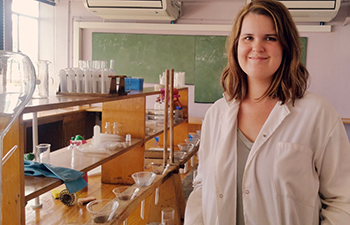Latest News Archive
Please select Category, Year, and then Month to display items
06 April 2018
Photo Rulanzen Martin
 From the left: Dr Thulisile Mphambukeli, leader of the BRICS research team that is exploring the political economy of water and food security, and her research partner, Dr Victor Okorie.
From the left: Dr Thulisile Mphambukeli, leader of the BRICS research team that is exploring the political economy of water and food security, and her research partner, Dr Victor Okorie.
A Brazil, Russia, India, China and South Africa (BRICS) delegation is to hold the 10th Annual BRICS Summit in the last week of May 2018 in Johannesburg. Dr Thulisile Mphambukeli, leader of the University of the Free State (UFS) research team alongside Dr Victor Okorie from the Department of Urban and Regional Planning, in collaboration with Prof Lere Amusan of North-West University, will ensure that water and food security is a prominent feature on the gathering’s agenda.
First, the project titled: “Exploring the political economy of water and food security nexus in BRICS and Africa” will debut at the National Institute for the Humanities and Social Sciences BRICS Think Tank Forum”.
According to Dr Mphambukeli, the key to water security is attitudinal change by means of education and conscientisation. This, she is adamant about, holds the potential to drive behavioural adjustments in the way society interacts with water.
Genetic and social approaches
Dr Okorie asserts that if strides towards reducing the demand for water were to be made, research efforts should be geared towards effecting changes at DNA level. Meaning we need to explore waterwise ways that enable crops and animals to thrive optimally.
The project also looks at social dimensions of water such as flushing a toilet. “Research activities on redesigning toilets, especially the urinal, where more than nine litres of water are used to flush less than one cubic centimetre of urine, are timely in the context of managing water and the food nexus crises,” said Dr Okorie.
Combining the genetic and social approaches would allow us to produce more with a smaller water footprint. This can be made possible by implementing precision agriculture which is about estimating and applying exact quantities of water and nutrients needed for the production of crops or the raising of livestock.
Paradigm shifting policies
Prof Amusan said the team intended to propose functional solutions that take the quality of water into consideration. Equitable production and distribution of water depends on endorsing policies of co-production between citizens, governments and the public sector. BRICS member states mutually consider water and food security as an issue of paramount significance, hence its feature on this prestigious summit’s agenda.
Postgraduate student to conduct research on maize quality at Michigan State University
2017-03-27

Schae-Lee Olckers, master’s student in the
Department of Microbial Biochemical and
Food Biotechnology.
Photo: Supplied
Schae-Lee Olckers, a master’s student in the Department of Microbial Biochemical and Food Biotechnology at the University of the Free State (UFS), will be travelling to the US in a few weeks’ time. For the next two years she will be doing research at the Michigan State University (MSU) at its Department of Food Science, working on wheat quality and its baking properties.
Increase the nutritional value of maize
The title of her master’s research project is: “The influence of low and optimal nitrogen conditions on the nutritional value of quality protein maize”. She is focusing on the influence of environmental conditions on the nutritional value of maize.
New hybrids of maize production developed
Olckers said: “I chose to start my research on this specific topic in my honours year because maize is the main staple crop in South Africa, as well as in the rest of Africa. Therefore, micronutrient malnutrition is a major concern for developing countries as well as for poor people who rely on it as a major food source. I found it interesting that these breeding programmes that are being developed for new hybrids of maize for production are focusing on increasing the nutritional value of maize and can therefore help eliminate micronutrient malnutrition in some populations of poor communities,” she said.
Prof Perry Ng will be her research supervisor. He is an affiliated professor at UFS in the division of Plant Breeding. “I am very excited about the opportunity to travel and to gain experience working with a well-known cereal scientist. The work he does is also closely associated with my research,” said Olckers.
Her supervisors at UFS are Profs Garry Osthoff and Maryke Labuschagne from the Departments of Microbial Biochemical and Food Biotechnology and Plant Sciences respectively.